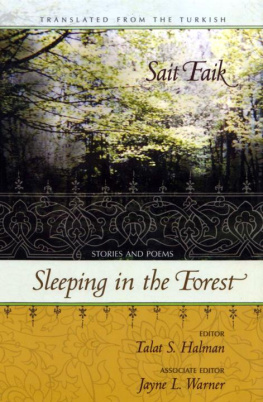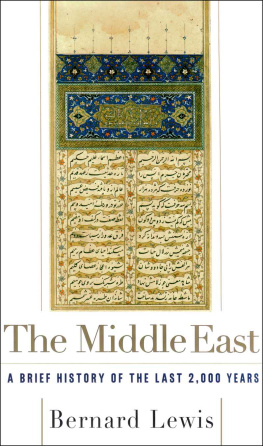
A Child from the Village
Sayyid Qutb; John Calvert and William Shepard, trans.
The Committee
Sonallah Ibrahim; Mary St. Germain and Charlene Constable, trans.
A Cup of Sin: Selected Poems
Simin Behbahani; Farzaneh Milani and Kaveh Safa, trans.
In Search of Walid Masoud: A Novel
Jabra Ibrahim Jabra; Roger Allen and Adnan Haydar, trans.
Three Tales ofLove and Death
Out el Kouloub
Women Without Men: A Novella
Shahrnush Parsipur; Kamran Talattof and Jocelyn Sharlet, trans.
Zanouba: A Novel
Out el Kouloub; Nayra Atiya, trans.
Bait Taik
STORIES AND POEMS
Translated from the Turkish
Editor, Talat S.Halman
Associate Editor, Jayne L.Warner




Contents
stories
Poems
Preface
TURKISH LITERATURE REMEMBERS and reveres Sait Faik as its premier master of the short story. In a career that spanned a mere quarter of a century, Sait Faik (1906-1954) turned out some 190 original short stories, two novellas, a few essays, and nearly forty poems. His fame rests squarely on his fiction, which deals mainly with the fishermen, workers, clerks, children, idlers, and mavericks of Istanbul. Many of his principal characters are from non-Muslim communities. The author often speaks in the first person and figures prominently in some of the stories as a persona. With a subtle style that, despite occasional complexities, was attuned to the simple natural rhythms of colloquial Turkish, Sait Faik portrayed the predicaments, maladjustments, and disillusionments of the man in the street, frequently himself, living on the fringes of society.
Among hallmarks of Sait Faik's fiction are narcissistic narration, a style that blends the vernacular with lyric touches, a tender humanistic empathy, and ironic twists in the story line. A romantic at heart, he often approached harsh reality without cynicism and with an underlying sense of optimism.
Sleeping in the Forest contains a representative selection from Sait Faik's work-twenty-five short stories, the first part of a four-part novella, and twelve poems. The translations have been done by a distinguished roster of experts in the field of Turkish literature. The introduction is by one of Turkey's most successful academic critics. The book has benefited immeasurably from Jayne L.Warner's meticulous editing.
Editing the work of Sait Faik is a formidable task. He often wrote in great haste, carelessly. The translators and editors of this volume occasionally struggled with surprising leaps in the story lines, shifting tenses, and stylistic oddities. Numerous critics have dwelt on this type of carelessness. It must be pointed out, however, that there is a counterargument. Melih Cevdet Anday, one of Turkey's eminent literary figures, has defended this lack of meticulousness as a hallmark of Sait Faik's unique style. "As far as I am concerned," Anday said, "Sait Faik was not sloppy in his use of language. Whatever he did stylistically, he did for deliberate effect."
Sait Faik, immensely popular in his native country, has also attracted attention abroad. Books featuring his work have been available in French, English, Russian, and Spanish. Dozens of his short stories have been translated into many languages and published in anthologies and literary magazines around the world. There is one Sait Faik book in English: A Dot on the Map: Selected Stories and Poems, published by Indiana University in 1983.
"The Armenian Fisherman and the Lame Seagull" is a shorter and somewhat different version of "An Episode of Two," which appears in my translation in A Dot on the Map. The poem "Letter I" originally appeared with the title of "First Letter" in the same book.
"The Stelyanos Hrisopoulos," in a more recent translation by the late Nermin Menemencioglu (Streater), was in A Dot on the Map in Spiro Kostof's translation.
The editors are grateful to Aysegiil Nazik, Beyhan Uygun Aytemiz, and Hivren Demir, graduate students at Bilkent University, who contributed a great deal to the editing and bibliographic work. They are also grateful to Demet Gtizelsoy Chafra, who patiently and efficiently typed the entire manuscript many times and made invaluable contributions to the production of this volume.
The present book is a testament to Sait Faik's enduring stature in Turkey and to the growing interest in him in the English-speaking world. I hope readers will derive pleasure from the selected stories of the Turkish master.
Talat S.Halman
Guide to Turkish Spelling and Pronunciation (image)
THROUGHOUT THIS BOOK Turkish proper names and special terms conform to standard modern Turkish spelling. The pronunciation of the vowels and consonants is indicated in the guide below:


Of the twenty-nine characters in the Turkish alphabet, six do not exist in English: c, g, i, o, s, ti. The letters q, w, and x are not in the Turkish alphabet, although they may occur in foreign names. The letter g has its own capital G but never starts a word. The undotted i and the dotted i are separate vowels whose distinctions are strictly observed in pronunciation and spelling. These two letters have their individual capitals as well: I and I respectively.
The few exceptions to authentic Turkish spellings are words that have found their way into the English language and appear in standard English dictionaries, for example, rake or efendi, which have their anglicized versions, raki and effendi. The names of the cities of Istanbul and Izmir, commonly spelled with I in Turkish, are spelled as they normally are in English, that is, with an I.Names of Muslim Turks and members of ethnic minorities appear in the translations exactly as they are spelled in modern Turkish.
Punctuation and English spelling conform to current standard American use.
Monetary Terms
The stories in this collection cover a period of about twenty years from the mid- 1930s to 1954, during which period currency values fluctuated. The changes due to inflation, particularly the rampant increases in later decades, render the monetary references virtually meaningless. All of the monetary references, therefore, have been kept in the original amounts and might at best give the reader some idea about values, prices, salaries, and the like.

























